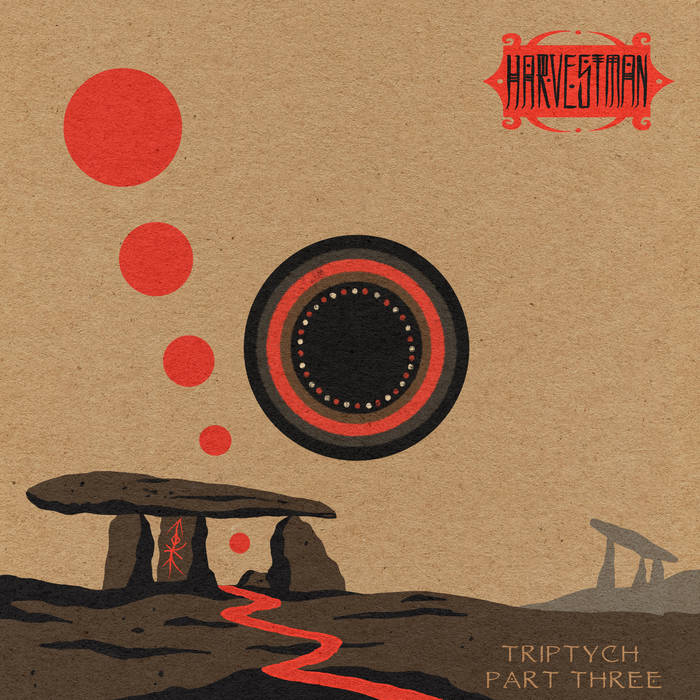The Breakdown
If you missed gazing at the Hunter Moon last week then here’s a permanent audio reminder of its beauty, significance and restorative power. Steve Von Till aka Harvestman, the prolific deliverer of sounds via post metal totems Neurosis, Tribes of Neurot and his solo work, has released ‘Triptych Part Three’, the final album in his moon cycle trilogy. In April Harvestman honoured the Pink Moon with ‘Part One’, a collection of subtle soundscapes, other-worldly drones, gentle cosmic rock, early kosmische and eerie electronic folk. ‘Part Two’ focused on the Buck Moon, reflecting change and progression, abundance and vitality. The consequent music pulsated with a burgeoning energy, more strident, assertive and, you guessed it, riffy. So what about ‘Part Three’, how does this particular lunar commemoration pan out?
With a connected work of this scale, released in such a confined period, balancing narrative and repetition while keeping the music fresh was always a risk but one which Von Till/Harvestman has navigated creatively. The third chapter stays within the similar structural framework as the previous albums in terms of visual presentation, another remarkable glyph-style artwork from Henry Hablak, and general soundscape, primarily instrumental and expansive. However on this third album, the sonics seem to signal contemplation and a sense of completion.
‘Triptych Part Three‘ begins with the established project partnership of Von Till and Om bassist Al Cisnerous building a riff pattern of familiar scale and primal intent for Clouds Are Relatives. Growing from zithery, raga-toned atmospherics their guitar and bass echo each other as the feedback squalls. The pace maybe sludge informed but these masters of the approach inject some potent drama into the procession. As on ‘Part One’ and ‘Two’, the lead in track gets re-imagined in dub form to mark the album’s second segment, this time around with dark techno multi-tasker The Bug at the controls. Here the feel is more fluid, the bassline deeper in the mix, the guitars’ twang emphasised and a bridge of mellotron tuned synths sounding sneakily prog. Plus the dub passages judder mightily, pushed to the edge of the deepest sound canyon then pulled miraculously back to the Clouds Are Relatives main tune.
As an auditory homage to the significance of the Hunter Moon, metaphors and folkloric imagery are rooted in these Harvestman pieces. On Snow Spirits crunching beats chase a fleeting synth pattern, things buzz and the thudding drums stomp. It’s the sound of pursuit with the doom core darkness of Blanck Mass. Herne’s Oak is even more graphic, a sonic retelling of the Elizabethan tale of a gamekeeper’s spirit which roamed Windsor Great Park. Found sounds of rattling chains and metallic squealing build around a visceral Neubauten-esque rhythmic thump before a melodic synth scale attempts to bring relief. Naturally the grinding noise eventually wins out in this theatrical but not over-acted re-staging.
Such dark folk vibrations seem more pronounced in this final part of Harvestman’s Triptych with pieces intent to burrow down deeper into the listener’s memory. There is an earthy reality to Eye the Unconquered Flame, a surging tidal synth drone spiked with bouzouki flourishes and stirred by a semantic choice of spoken word. We’re told to “Pull down thy vanity” or else. Less knowingly profound, The Absolute Nature Of Light is equally powerful with its blend of electronic and acoustic timbres, the single cavernous bass pulse and spiralling pipe melodies creating a sense of wonder and fragility. There are quiet shoots of resolution and rest being hinted at here by Von Till.
Such relative calm and contemplation fittingly re-surfaces on the album’s closing track Cumha Uisdein (Lament for Hugh) which, similar to the final moments of Part One and Part Two, references and re-imagines bygone folk sources. It’s a stirring emotional piece, kept uncluttered with the heart wrenching original piper’s melody at the centre while the synth mists shimmer. Poignantly the choice of such music, a traditional musical elegy aired at someone’s funeral, sees Harvestman respecting the last full moon of the year and the end of a stunning trio of releases.
After experiencing each of the albums in the Triptych it’s clear that they are strong and resonant enough to stand alone as individual pieces but maybe the full impact of Von Till’s project is gained from sequential listening. There’s no diktat around this, although the conceptual thrust which underpins the whole endeavour seems to edge towards that suggestion. Still, whatever way you take in the Triptych releases, singularly, when the mood takes you or strictly once a year with the corresponding moon event, this music will not fail to leave a mighty impression.
Get your copy of ‘Triptych Part Three‘ from your local record store or direct from Neurot Recordings HERE














No Comment